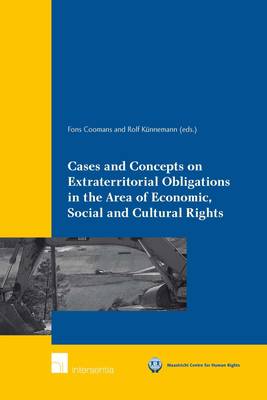
- Retrait gratuit dans votre magasin Club
- 7.000.000 titres dans notre catalogue
- Payer en toute sécurité
- Toujours un magasin près de chez vous
- Retrait gratuit dans votre magasin Club
- 7.000.0000 titres dans notre catalogue
- Payer en toute sécurité
- Toujours un magasin près de chez vous
Cases and Concepts on Extraterritorial Obligations in the Area of Economic, Social and Cultural Rights
Volume 14
Coomans Fons
74,00 €
+ 148 points
Description
From the Foreword by Prof. Olivier De Schutter, United Nations Special Rapporteur on the Right to Food: "This volume is the result of over ten years of research conducted jointly by non-governmental organisations and universities. It presents a range of cases in which the actions or omissions of States have impact on the enjoyment of human rights outside their national territory, raising the question of whether, and under which conditions, such conduct may engage the international responsibility of the States concerned. When the Maastricht Principles on Extraterritorial Obligations of States in the area of Economic, Social and Cultural Rights were adopted on 28 September 2011, it is these cases, among others, that the experts who developed these principles had in mind. As such, the series of case studies presented by Fons Coomans and Rolf KÃ?Â1/4nnemann is at the cutting edge both of human rights activism and of human rights doctrine. This volume provides clear evidence both that the Maastricht Principles are useful and important, and that if we accept to build on the extraterritorial obligations of States, the accountability gap that economic globalization has created can be closed." *** This book is essential reading for academics, students, non-governmental organizations, and other practitioners. The human rights community should start making the analysis of extraterritorial obligations a standard part of its casework. The cases in this book show why this is necessary and how this can be done. (Series: Maastricht Series in Human Rights)
Spécifications
Parties prenantes
- Auteur(s) :
- Editeur:
Contenu
- Nombre de pages :
- 304
- Langue:
- Anglais
- Collection :
Caractéristiques
- EAN:
- 9789400000469
- Date de parution :
- 22-05-12
- Format:
- Livre broché
- Format numérique:
- Trade paperback (VS)
- Dimensions :
- 160 mm x 240 mm
- Poids :
- 530 g

Les avis
Nous publions uniquement les avis qui respectent les conditions requises. Consultez nos conditions pour les avis.






